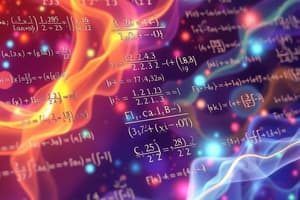Podcast
Questions and Answers
What is a key difference between AP Calculus AB and BC courses?
What is a key difference between AP Calculus AB and BC courses?
- Calculus BC includes statistics and probability applications, while Calculus AB does not.
- Calculus AB focuses on differentiation and integration only, while Calculus BC covers additional topics like sequences and series. (correct)
- Calculus BC focuses on differentiation and integration only, while Calculus AB covers additional topics like sequences and series.
- Calculus AB includes parametric equations and polar coordinates, while Calculus BC does not.
Which of the following best describes the focus of Statistics courses in the context of AP?
Which of the following best describes the focus of Statistics courses in the context of AP?
- Exploring algebraic expressions and equations.
- Studying geometry and spatial reasoning.
- Solving calculus equations and derivatives.
- Organizing data, drawing conclusions, and making predictions based on evidence. (correct)
What advanced topics are covered in AP Calculus BC but not in Calculus AB?
What advanced topics are covered in AP Calculus BC but not in Calculus AB?
- Parametric equations, polar coordinates, vector functions, and improper integrals. (correct)
- Sequences and series only.
- Statistics applications and probability theory.
- Limits, differentiation, and integration.
Which statement best explains the role of AP Mathematics courses in preparing students for college-level work?
Which statement best explains the role of AP Mathematics courses in preparing students for college-level work?
What makes Calculus BC more challenging than Calculus AB?
What makes Calculus BC more challenging than Calculus AB?
Which field benefits from a deep understanding of Statistics as mentioned in the text?
Which field benefits from a deep understanding of Statistics as mentioned in the text?
What is a key focus of AP Statistics?
What is a key focus of AP Statistics?
Which of the following is covered in AP Math Analysis and Synthesis?
Which of the following is covered in AP Math Analysis and Synthesis?
What is emphasized in AP Computer Science Principles?
What is emphasized in AP Computer Science Principles?
Which aspect plays a crucial role in understanding three-dimensional spaces in AP Math courses?
Which aspect plays a crucial role in understanding three-dimensional spaces in AP Math courses?
What do discrete structures in AP Computer Science Principles help students to develop?
What do discrete structures in AP Computer Science Principles help students to develop?
In which field do AP math courses aim to foster critical thinking and problem-solving abilities?
In which field do AP math courses aim to foster critical thinking and problem-solving abilities?
Flashcards are hidden until you start studying
Study Notes
Exploring Mathematics through Advanced Placement (AP) Courses
Mathematics lies at the heart of numerous disciplines, from science and engineering to finance and economics. As students delve deeper into this field, they often encounter advanced concepts that prepare them for college-level work and beyond. This overview will explore mathematics through the lens of Advanced Placement (AP) courses, particularly highlighting areas where students can develop their acumen with complex mathematical ideas.
Overview of AP Calculus AB and BC
Calculus is arguably one of the most pivotal subjects in modern math, and it's broken down into two distinct AP tracks: Calculus AB and Calculus BC. Both curricula involve the study of limits, differentiation, integration, and applications of calculus in real-world problems. Calculus BC goes further, covering more challenging material such as sequences and series, parametric equations, polar coordinates, vector functions, and improper integrals. These courses help students build essential foundations for higher-order calculus classes and other STEM programs.
Problems Solving Techniques in AP Statistics
Statistics provides methods for organizing data, drawing conclusions, and making predictions based upon evidence. In AP Statistics, students learn how to formulate probabilities, analyze sample distributions using various techniques like sampling and hypothesis testing, interpret confidence intervals, perform regression analysis, run experiments while controlling variables, and design surveys. Students also investigate statistical ethics and consider potential pitfalls when employing statistics in decision-making processes.
Geometry Concepts in AP Math Analysis and Synthesis
In geometry, AP Math Analysis and Synthesis focuses on proving congruence and similarity between figures by utilizing properties of corresponding angles and sides; analyzing transformations including rotations, reflections, translations, and dilations; measuring lengths, areas, volumes, and surface areas; exploring lines, planes, curves, solids, angles, polygons, circles, cylinders, spheres, cones, polyhedra, and other geometric objects. Additionally, trigonometric relationships, coordinate geometry, and analytic geometry principles play crucial roles in understanding three-dimensional spaces.
Discrete Structures in AP Computer Science Principles
While many people connect computer science primarily with programming languages, AP Computer Science Principles emphasizes the underlying structures within computing. In discrete mathematics, students examine sets, relations, graphs, algorithms, and complexity theory as they relate to problem solving in computers and computation. By doing so, aspiring programmers gain valuable skills necessary for designing software systems, developing solutions to computational problems, and creating effective algorithm models.
These core aspects of AP mathematics aim to foster critical thinking, problem-solving abilities, creativity, communication skills, and perseverance—all essential for excelling in academia and future careers. While AP math courses require dedication and hard work, they undoubtedly open doors to new opportunities and equip students with tools for success across diverse fields.
Studying That Suits You
Use AI to generate personalized quizzes and flashcards to suit your learning preferences.




